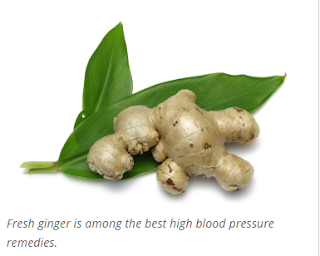Today, more and more research confirms that spices are great high blood pressure remedies.
Did you know you may have historical wonder drugs in your cabinet? And we’re not referring to your medicine cabinet. Consider your kitchen: Herbs and spices have been used as antidotes ever since mankind felt the first pangs of pain and illness. Many spices and herbs that you can find in your pantry are known to be high blood pressure remedies.
High Blood Pressure Remedies: Ginger
Is ginger good for high blood pressure? Taking ginger for hypertension can be an effective remedy. Ginger root (Zingiber officinale) is an herbaceous perennial plant that produces the spice known as ginger. Ginger has been commonly used in Chinese medicine to treat digestive problems such as nausea, vomiting, abdominal bloating, and diarrhea. Ginger has also been used to treat inflammatory joint diseases including rheumatism and arthritis. What’s not so well-known are the benefits of taking ginger for high blood pressure.
Ginger works in a similar way to blood pressure medications called calcium channel blockers, which relax your blood vessels, making it easier for your heart to pump blood through your body. Ginger also contains potent anti-inflammatory compounds called gingerols and shogaols. These phenol compounds are the reason why so many people with joint conditions experience reductions in their pain levels and improvements in their mobility when they consume ginger regularly. But, gingerol and shogaol compounds also have the ability to decrease high blood pressure.
Ginger products are available in extracts, capsules, and oils. When purchasing a ginger supplement, make sure it contains 4 percent volatile oils or 5 percent total pungent compounds including gingerol or shogaol. Take between 75 to 2,000 mg of ginger in divided doses with food, but do not take more than 4 grams of ginger per day, including food sources. Pregnant women should consume no more than 1 gram of ginger per day. People taking hypertension (high blood pressure) medications should not take ginger supplements without talking with their doctor.
High Blood Pressure Remedies: Turmeric and Curcumin
Is turmeric good for high blood pressure? Turmeric (Curcuma longa) contains a strong anti-oxidant called curcumin. Curcumin is also a potent anti-inflammatory, it helps lower blood cholesterol, and it has anti-clotting properties. Curcumin helps keep blood vessels healthy by protecting cells from damage, thereby allowing smoother flow of blood.
Curcumin also has the ability to dilate arteries. Researchers conclude that curcumin works much the same way as ginger as it inhibits the transport of calcium, which acts as a chemical messenger that tells muscle cells to contract, thereby dilating the arteries. Therefore, taking turmeric for high blood pressure, due to its active ingredient curcumin, can be a useful remedy.
Turmeric is available in liquid extracts and capsules containing the powder. Adults can take 400 to 600 mg of standardized curcumin powder 3 times daily. For extracts, take 30 to 90 drops daily. For dried cut root or dried powdered root, 1.5 to 3 grams per day are recommended.
Turmeric blood pressure remedies are not perfect though. One of the challenges with curcumin is that humans have an extremely poor absorption of curcumin in the gastrointestinal tract. When we take a powdered form (as capsules), the curcumin itself is not absorbed but breaks down into a number of metabolic products which are much less beneficial than the curcumin itself.
However, mixing curcumin with fish oil, coconut oil, or extra virgin olive oil greatly increases absorption—up to seven times improvement. If you don’t want to fool with that mixing mess and want a relatively inexpensive supplement form, use the curcumin phytosome complex supplements that are readily available. Recent research has shown that this form’s bioavailability in the human body is approximately four times better than plain curcumin.
Don’t exceed the recommended dose of turmeric (curcumin). In high doses, it may cause stomach upset and ulcers. If you have diabetes, turmeric may lower blood sugar to dangerous levels, especially if you’re also taking diabetes medication. Do not take curcumin before speaking to a physician if you have gallstones, a bile duct disorder or if you’re taking medications such as stomach-acid drugs or blood thinners, including aspirin. Always consult a physician before taking turmeric and high blood pressure meds.
High Blood Pressure Remedies: Foods
A variety of foods and drinks can help lower blood pressure too. Here are just a few, with links to learn more about each.
- Coconut water- Flaxseed
- Beet and apple juice
- Prunes
- Vegetable juice












